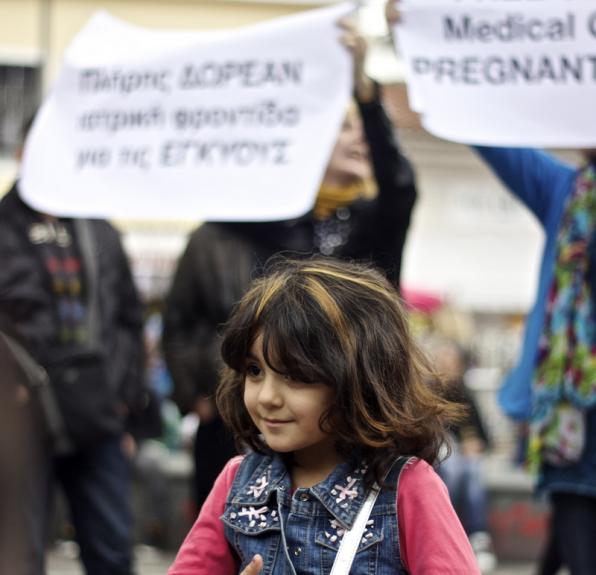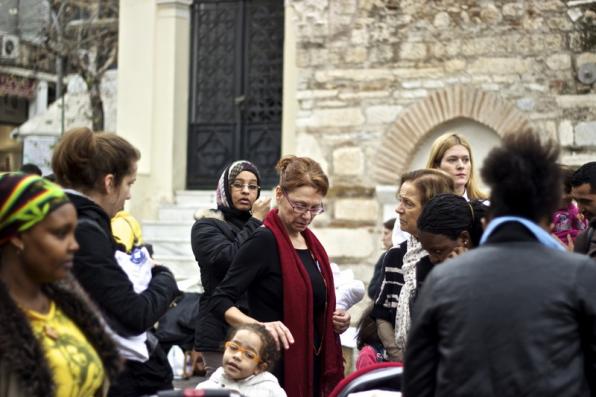In the early 1950’s nearly 30,000 children were infected by the poliovirus every year in Europe according to UNICEF. Polio is a serious disease transmitted from person to person that can cause lifelong paralysis and death. To this day there is no known cure. Yet in 2002 Europe was declared a polio free zone for the first time in history. The reason? Vaccines.
But polio could now make a comeback due to irresponsible cuts to health care programs, the NGO Medecins du Monde (MdM) warned in a recent press conference about the effects of austerity on public health.
In terms of the advances made by modern medicine over the past century-and-a-half, few could claim to be nearly as important and effective as vaccination programs. Aside from polio, vaccines have protected generations of children from a host of potentially fatal diseases including measles, mumps, rubella and others. That they are a highly cost effective public health measure is beyond doubt.
Yet even these objective facts have not prevented the Greek Ministry of Health from terminating state programs to vaccinate uninsured children. Uninsured Greek families are now required to cover the cost of the vaccination of their children. This, over a period of years and including necessary booster shots can amount to over 1,000 euros. Needless to say in a country with 28% unemployment and an estimated 3 to 4 million without health coverage, increasing numbers of families cannot afford this cost. As a result more and more children are going without vaccinations.
Of course the Greek government is not solely to blame for the cuts. Many of them have come as part of Greece’s attempt to meet the troika mandated target that health spending must not exceed 6% of GDP. Given that Greece’s GDP has been shrinking for over 6 years and is now 25% smaller than it was in 2007, it is target that is also continually shifting. Also it should be pointed out that the populace does not necessarily require 25% less health-care when the economy is 25% smaller. In fact the opposite tends to hold true with social spending more crucial to vulnerable groups in hard economic times.

Medecins du Monde Greece has performed vaccinations on 9.000 children in 2013 alone (Image: James G Bounias)
For the moment, according to MDM doctors, unvaccinated children are still protected in part by the so-called ‘herd immunity’: as a significant portion of the population is still immune to many diseases it is harder for these to take hold and for epidemics to spread. However with every year that passes as more children remain unvaccinated the threat of outbreaks of serious diseases increases. Such outbreaks of measles have already occurred in other countries after parents refused to vaccinate their children following unfounded fears that the MMR vaccine was linked to autism.
In other words, with the current policies in place it is not a matter of if, but when, more children will be infected by deadly diseases preventable by simple vaccinations.
Yet the Ministry of Health remains blissfully and willingly oblivious to this simple fact. So untroubled is it by the effects of its policies that it does not even have a system in place to monitor them according to MdM. As a result nobody actually knows how many children are currently unvaccinated.
“As MdM we vaccinated about 9,000 children in Greece in 2013,” Dr Anna Maili, the president of MdM Greece said. “But those are only the people who have come to our clinics. As a country we do not know how many children are going without vaccinations. The ministry has shown absolutely no desire to monitor the situation.” That willful blindness appears to extend to Health Minister Adonis Georgiadis himself who, according to Dr Maili, when asked recently at a meeting with the NGO about the issue of vaccinations simply denied that there was any problem.
If denying children vaccinations wasn’t counter-productive enough, the ministry has also seen fit to charge uninsured pregnant women for the cost of their prenatal scans, antenatal care (about €650 each) as well as the cost for delivering their children (1,200 euros for a normal delivery, 1,400 in the case of a Caesarian section).
Giving the state a new citizen is not enough apparently, even in a country with a critically low birthrate, and uninsured women must now pay to do so. Any bills that cannot be covered by the women are added to their tax bills, leaving such mothers open to additional fines and even prison sentences if they are unable to pay the cost to the state of giving birth. MdM has even reported cases of hospitals denying children birth certificates until the bill for the delivery is paid. MdM provided support to 450 pregnant women in 2013 but again there are no official statistics for uninsured women unable to afford the cost of having their children in hospital. The government, presumably, was not that interested in knowing.
This, incidentally, is the same government that recently decided to bail-out the Athens Concert Hall Organization, a private NGO managed by well-connected media barons, to the tune of 230 million euros with no questions asked. Of the bailout the culture minister said, “culture cannot be for sale.” It’s only a pity that pregnant women and children are not afforded the same privilege.

Medecins du Monde Greece President Anna Maili (Image: James G Bounias)
Denying uninsured children and pregnant women basic health care are just two of the more egregious examples of spending cuts in the sector that will cost the nation more in the long run than they will save in the short term. The effects of the cuts in a number of areas are already becoming apparent according to a study by the universities of Oxford, Cambridge and the London School of Hygiene and Tropical Medicine that was published in the Lancet medical journal and released last week.
Among the study’s findings is that the number of new HIV cases has spiked in recent years due to decreases in funding for programs giving needles and condoms to IV drug users. Stillbirths have risen 21% from 2008 to 2011. Perhaps most shockingly infant mortality jumped 43% in only two years between 2008 and 2010.
While Greece is by far the most seriously affected country, other European nations imposing austerity are also beginning to see similar problems. Aside from European citizens, immigrants are also suffering as they are being completely frozen out of the system and increasingly subject to blame and xenophobia.
Doctors of MdM highlighted as indicative of the callousness demonstrated by European health systems the example of a young irregular migrant in Spain who, after being turned away six times from public hospitals, eventually died from tuberculosis. Aside from the tragedy of a young man losing his life to a treatable disease, there is also the public health issue of allowing an infectious disease to go untreated and thereby increasing the chance that it will spread.
The argument of MdM and other European health professionals is clear: austerity imposed health care cuts are not only morally repugnant but ultimately a false economy. ‘Health is not a luxury,’ Professor Jochen Zenker, President of MdM Germany told TPPi, “it can be very effective and efficient to keep people healthy. It is something that also benefits businesses and the area of employment.”
For who seriously believes that a country can be healthy economically when its citizens physically are not?